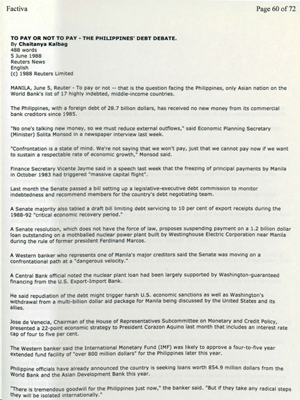TO PAY OR NOT TO PAY – THE PHILIPPINES’ DEBT DEBATE
[Reuters]
Published date: 5th Jun 1988
5 June 1988
Reuters News
English
(c) 1988 Reuters Limited
MANILA, June 5, Reuter – To pay or not — that is the question facing the Philippines, only Asian nation on the World Bank’s list of 17 highly indebted, middle-income countries.
The Philippines, with a foreign debt of 28.7 billion dollars, has received no new money from its commercial bank creditors since 1985.
“No one’s talking new money, so we must reduce external outflows,” said Economic Planning Secretary (Minister) Solita Monsod in a newspaper interview last week.
“Confrontation is a state of mind. We’re not saying that we won’t pay, just that we cannot pay now if we want to sustain a respectable rate of economic growth,” Monsod said.
Finance Secretary Vicente Jayme said in a speech last week that the freezing of principal payments by Manila in October 1983 had triggered “massive capital flight”.
Last month the Senate passed a bill setting up a legislative-executive debt commission to monitor indebtedness and recommend members for the country’s debt negotiating team.
A Senate majority also tabled a draft bill limiting debt servicing to 10 per cent of export receipts during the 1988-92 “critical economic recovery period.”
A Senate resolution, which does not have the force of law, proposes suspending payment on a 1.2 billion dollar loan outstanding on a mothballed nuclear power plant built by Westinghouse Electric Corporation near Manila during the rule of former president Ferdinand Marcos.
A Western banker who represents one of Manila’s major creditors said the Senate was moving on a confrontational path at a “dangerous velocity.”
A Central Bank official noted the nuclear plant loan had been largely supported by Washington-guaranteed financing from the U.S. Export-Import Bank.
He said repudiation of the debt might trigger harsh U.S. economic sanctions as well as Washington’s withdrawal from a multi-billion dollar aid package for Manila being discussed by the United States and its allies.
Jose de Venecia, Chairman of the House of Representatives Subcommittee on Monetary and Credit Policy, presented a 22-point economic strategy to President Corazon Aquino last month that includes an interest rate cap of four to five per cent.
The Western banker said the International Monetary Fund (IMF) was likely to approve a four-to-five year extended fund facility of “over 800 million dollars” for the Philippines later this year.
Philippine officials have already announced the country is seeking loans worth 854.9 million dollars from the World Bank and the Asian Development Bank this year.
“There is tremendous goodwill for the Philippines just now,” the banker said. “But if they take any radical steps they will be isolated internationally.”
Central Bank Governor Jose Fernandez said recently that resolving the Philippine debt problem was not simply a matter of returning to negotiations with creditors. The key, he said, was “to determine what is feasible”.






